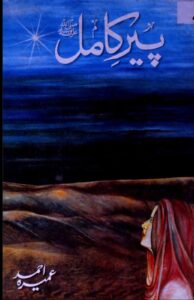Written By: Daniyal Hassan
Intoduction
Umera Ahmed’s novel Peer-e-Kamil (S.A.W) is one of the most powerful and inspiring stories in Urdu literature. The title means “The Perfect Mentor,” and it refers to the Prophet Muhammad (peace be upon him). The book shows how guidance from faith and truth can completely change a person’s life. It is not just a love story; it is a journey from darkness to light, from sin to faith, and from ignorance to knowledge.
The story begins with Imama Hashim, a brilliant and ambitious medical student. She belongs to a wealthy and conservative family. At first, her life seems perfect. She has everything, including comfort and an engagement to her cousin Asjad.
But Imama’s life changes completely when she discovers the true message of Islam and converts from the Ahmadi faith to Islam. This perfectly mirrors Imama Hashim’s devotion and faith. She gives up her comforts, family, and wealth for the love of Allah and His Messenger (SAW). She proves that true loyalty to the Prophet means sacrificing worldly desires for spiritual truth. Read more about Peer-e-Kamil
What Allama Iqbal expressed about Peer-e-Kamil
Allama Iqbal expressed in his poetry;
کہ محمدؐ سے وفا تونے تو ہم تیرے ہیں
یہ جہاں چیز ہے کیا، لوح و قلم تیرے ہیں
If we are faithful to Muhammad (S.A.W), then we are truly Yours, O God,
This world and all its treasures are nothing compared to his love.

Her conversion becomes a huge problem for her family, who reject her decision and try to force her into marriage. Imama’s struggle for faith and independence is both emotional and brave.
On the other hand, there is Salar Sikandar, a young man from an elite background. He is
extremely intelligent, with an IQ of 150, and talented in studies, sports, and music. But he uses his intelligence in the wrong way. Salar is arrogant, careless, and lost in a life of pleasure and luxury. He does not believe in religion and lives only for worldly enjoyment. His life shows the emptiness that comes from living without a higher purpose.
Imama and Salar’s lives are completely different, yet fate brings them together in unexpected ways. At first, they dislike each other. But through a series of events, Salar helps Imama escape from her home when her family tries to imprison her. He helps her out of mischief at first, but this act changes both of their lives forever.
As the story moves forward, both characters grow and change deeply. Imama’s journey is about faith, courage, and sacrifice. She gives up her family, comfort, and social status for the sake of truth. Her patience and trust in Allah make her one of the most inspiring heroines in Urdu literature.
Salar’s journey is even more surprising. After a life full of arrogance and sin, he faces feelings of guilt and emptiness. Slowly, he begins to search for meaning in life. He studies religion, feels the pain of his wrongdoings, and realizes that true peace comes only from Allah.
Allah Almighty said in the Quran; ذَٰلِكَ فَضْلُ اللَّهِ يُؤْتِيهِ مَن يَشَاءُ ۚ وَاللَّهُ ذُو الْفَضْلِ الْعَظِيمِ﴾] الجمعة[: 4 ﴿
[That is the bounty of Allah, which He gives to whom He wills, and Allah is the possessor of great bounty].
His journey of repentance is emotional and beautifully written. The proud genius turns into a humble believer. This transformation from darkness to light is the heart of the story.
The novel’s main theme is spiritual awakening and how guidance from Allah and the teachings of the Prophet Muhammad (S.A.W) can change anyone, no matter how lost they are. It also teaches forgiveness, the value of faith, women’s strength, and the difference between worldly success and spiritual peace.
Umera Ahmed’s writing is simple but full of emotion. She uses clear dialogue, real-life situations, and believable characters to express strong messages. Her storytelling makes readers think about their own lives and beliefs. The difference between Imama’s purity and Salar’s arrogance is written beautifully. The novel moves at a good pace, mixing romance, suspense, and spirituality in a balanced way.
The author also uses symbolism in a meaningful way. Darkness represents ignorance and sin, while light symbolizes knowledge, faith, and divine guidance. The Prophet Muhammad (S.A.W) is shown as the perfect guide, the true Peer-e-Kamil, for anyone who wants to find the right path.
Both main characters are unforgettable. Imama Hashim represents faith, modesty, and the courage to follow truth. Her quiet strength inspires readers to hold on to their beliefs even when the world is against them. Salar Sikandar represents human weakness but also the ability to change. His transformation is slow but powerful. From being proud and rebellious, he becomes a spiritual person who finds peace through repentance and prayer.
The side characters like Asjad, Javeria, and Waseem add realism to the story. They show how society reacts to faith, change, and personal choices. Some support, while others judge.
The novel gives a strong message: no one is beyond guidance if they truly seek it. Wealth, education, and intelligence mean nothing without faith. The story also reminds us that Islam is not just a religion but a complete way of life that brings peace and purpose.
Many scenes are deeply emotional, such as Imama’s loneliness, Salar’s guilt, and their final meeting after years of change. The story encourages readers to think about their own lives, repent for mistakes, and rebuild themselves. Umera Ahmed beautifully shows that even the worst sinner can become a beloved of Allah if they sincerely turn back to Him.
Peer-e-Kamil (S.A.W) is more than a novel. It is a lesson about life, choices, and the search for truth. It teaches that everyone has the chance to change and that true success lies in pleasing Allah, not the world. Through the journeys of Imama and Salar, Umera Ahmed shows that the path to light is always open for anyone who wishes to walk it.
Final Words
In the end, Peer-e-Kamil is not just a novel—it is a mirror that reflects the deepest struggles and brightest transformations of the human soul. Through Imama’s unwavering faith and Salar’s journey from arrogance to humility, Umera Ahmed reminds us that guidance is a gift reserved for the hearts that seek truth with sincerity.
Peer-e-Kamil teaches that no matter how lost a person may be, the path toward Allah is never closed; one sincere step toward Him can change a lifetime of misguidance. The spiritual awakening portrayed in Peer-e-Kamil encourages readers to examine their own lives, their own mistakes, and their own distance from faith. It is a reminder that true peace does not lie in wealth, intelligence, or worldly recognition, but in the purity of intention and closeness to Allah and His Messenger (S.A.W).
The powerful message of Peer-e-Kamil stays with the reader long after the final page—whispering that light always overcomes darkness, that repentance is always accepted, and that Allah’s mercy embraces even the most broken hearts. This novel continues to inspire because Peer-e-Kamil is more than a story; it is a spiritual journey, a call toward truth, and a promise of hope for every soul searching for its purpose.
In every chapter, Peer-e-Kamil reminds us that the ultimate success is not in worldly achievements, but in becoming the kind of person who follows the path shown by the Perfect Mentor, the Prophet Muhammad (S.A.W). And that is why Peer-e-Kamil will forever remain one of the most cherished masterpieces of Urdu literature. Read More about Independent Publishers
The writer is a student of National Institute Of Pakistan Studies At Quaid e Azam University Islamabad.
Contact: daniyalhassandana921@gmail.com











